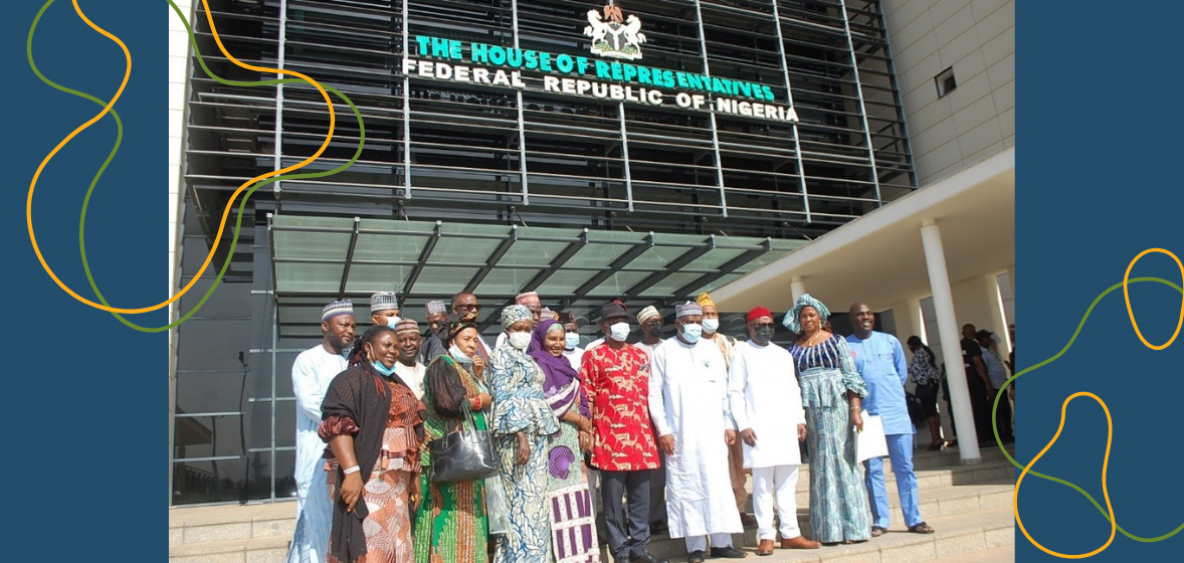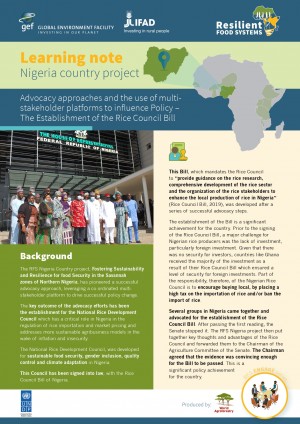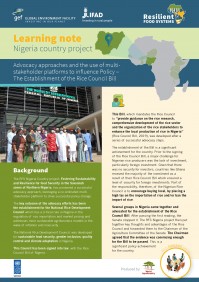 Group photograph of the advocacy team with the House Committee members in front of the Nigerian Senate.
Group photograph of the advocacy team with the House Committee members in front of the Nigerian Senate. The RFS Nigeria team has made multi-stakeholder platforms a mainstay of their project activities to ensure everyone in the agricultural value chain has a voice in transformation. One such platform has successfully influenced and advocated for the new Rice Council Bill.
Influencing policy and advocating for sustainable and resilient food systems benefit most from the diverse perspectives offered through multi-stakeholder platforms. Knowing this all too well, the Resilient Food Systems (RFS) Nigeria project, Integrated Landscape Management to Enhance Food Security and Ecosystem Resilience in Nigeria, has established a national, multi-stakeholder, gender-sensitive and inclusive advocacy platform that has made a tangible impact on the country’s rice value chain.
In March 2021, the RFS Nigeria project organised the National Workshop for the Establishment of Multi-stakeholder Gender-Sensitive platform with key stakeholders along the agricultural value chain, including producers, processors, research institutions and government agencies. To ensure the participation of women, the platform was founded in partnership with the Women Farmers Advanced Network (WOFAN) and gives voice to women, youth and civil society and connects them with a mechanism to influence policy as it relates to food and nutrition security.
Later that year, the platform paid a visit to the Nigerian House of Representatives and Senate to advocate on behalf of rural smallholder farmers and the agricultural sector. The meetings took place in Abuja between 28 November and 1 December 2021 and raised issues like:
The National Rice Council Bill was passed in January 2022 with this advocacy campaign being one of the external factors which influenced it. The resulting National Rice Council will “... provide guidance on the rice research, comprehensive development of the rice Sector and the Organization of the rice Stakeholders to enhance the local production of rice in Nigeria.” [from the Bill itself].
It is estimated that two million metric tonnes of rice make their way into Nigeria illegally every year, and the National Rice Council is going to do something about it. Hajia Salamatu Garba, founder and CEO of WOFAN and Lead Consultant for the multi-stakeholder platform facilitated by RFS Nigeria, says that the Nigerian Rice Council will empower rice farmers to grow rice sustainably and with higher yields, and that this involves everyone.
“This push [for speedy passage of the Bill] will be achieved by the active involvement of all the key stakeholders at this roundtable of major stakeholders to identify strategies of presenting our concerns and areas of prioritization towards addressing gender, climate change and quality control issues including security in the Rice sector bill,” said Hajia Salamatu Garba at the advocacy meeting in December 2021.
Led by Nigeria’s Federal Ministry of Agriculture and Rural Development (FMARD) in partnership with the United Nations Development Programme (UNDP), and funded by Global Environment Facility (GEF), the multistakeholder platform facilitated by RFS Nigeria has already seen impactful results. With the RFS programme ending in 2023, sustainability of programme activities is key, and the benefits of the National Rice Council are just beginning.
Download the newest RFS Learning Note from the Nigeria country project to learn more about the process they took for advocating for policy change.


The RFS Nigeria Country project, Fostering Sustainability and Resilience for Food Security in the Savannah zones of Northern Nigeria, has pioneered a successful advocacy approach, leveraging a coordinated multistakeholder platform to drive successful policy change. The key outcome of the advocacy efforts has been the establishment of the National Rice Development Council which has been signed into law with the Rice Council Bill of Nigeria. This Learning Note shares insight into the process and tips for sustainability and scalability for similar advocacy initiatives.
Subscribe to our monthly newsletter to receive updates on stories directly from the field across all our projects, upcoming events, new resources, and more.